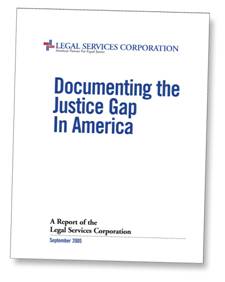|
What is the Legal Services Corporation?
The Congress of the United States entrusts the Legal Services Corporation with a dual mission: to promote equal access to justice and to provide high-quality civil legal assistance to low-income Americans.
Congress created LSC in 1974. Each year, as part of the budget process, Congress appropriates money for LSC. A bipartisan, 11-member Board of Directors -- appointed by the President of the United States with the advice and consent of the Senate -- oversees all aspects of LSC operations.
The main source of funding for civil legal aid, LSC gives grants to independent, local programs -- in 2009, 137 programs with more than 920 offices nationwide. Grants are awarded through a competitive process. Generally, the size of the grant is based on the number of people living in poverty in a given state or service area.
Who is helped by LSC-funded programs?
Three out of four clients are women-for the most part, mothers with children. Many are elderly or disabled. Some are veterans. All of them turn to LSC-funded programs for help -- to secure basic human needs such as safe and habitable housing, protection from domestic violence, child support, or essential health care.
LSC-funded programs make meaningful differences in individual lives. They also benefit society as a whole. Resolving an issue with a landlord, for example, can enable a family to keep its home and stay together instead of breaking up and becoming homeless.
 What kind of help is available? What kind of help is available?
In a typical year, four out of ten cases completed by LSC-funded programs revolve around family matters -- for example, domestic violence and child custody. The next largest category is housing -- for example, helping people become homeowners and preventing foreclosures. Most of the remaining cases revolve around income, consumer, and health issues.
How many are helped?
Each year, LSC-funded programs complete nearly one million cases -- for the most part, rapidly and out of court. Often, the problem is solved with legal advice, a referral, a letter, or a telephone call.
Nearly 51 million Americans are eligible to receive civil legal aid from LSC-funded programs, including 17.6 million children -- nearly one in four. Most are at or below 125 percent of the federal poverty level threshold, an income of approximately $26,500 a year for a family of four.
On average, LSC provides about half the budget of the programs it funds. LSC encourages programs to leverage limited resources by partnering and collaborating with other supporters of civil legal aid, including state and local government, the private bar, philanthropic foundations, and the business community.
America's justice gap
 LSC's groundbreaking report -- Documenting the Justice Gap in America: The Current Unmet Civil Legal Needs of Low-Income Americans -- confirms that our nation falls far short of meeting the need for civil legal aid. LSC's groundbreaking report -- Documenting the Justice Gap in America: The Current Unmet Civil Legal Needs of Low-Income Americans -- confirms that our nation falls far short of meeting the need for civil legal aid.
For two months, LSC-funded programs recorded the number of eligible people who came to their offices that they were unable to serve. On average, for every person served, one was turned away -- just 50 percent of those who actually sought help received it.
Other surveys indicate that 80 percent of the need is unmet. Even this may be an understatement -- many people who are eligible for civil legal aid do not seek it. Moreover, the analysis for the Justice Gap Report was completed before the 2008 recession and a series of natural disasters, including Hurricane Katrina, which swelled the need for civil legal aid and the number of people without access to it.
Our nation promises justice for all, not just for those who can afford to pay for it. The ideal may never be fully realized, but America can come closer to it. As Judge Learned Hand said, "If we are to keep our democracy, there must be one commandment: Thou shalt not ration justice."
back to top ^ |